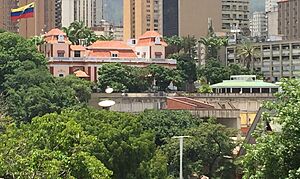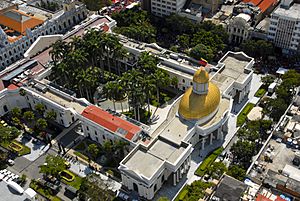Government of Venezuela facts for kids
Venezuela is a country in South America. It is a federal presidential republic, which means it has a president who leads the country and a system where power is shared between the central government and different states. The President of Venezuela is both the head of the country (like a king or queen, but elected) and the head of the government (like a prime minister). The President is in charge of the executive power.
The country's laws are made by the National Assembly. The highest court in Venezuela is the Supreme Tribunal of Justice, which handles judicial power.
Contents
How Laws Are Made
In Venezuela, new laws can be suggested by different groups:
- The President and their team (the executive branch).
- Members of the National Assembly (the legislative branch).
- The courts (the judicial branch).
- Special government officials who protect citizens' rights (the citizen branch), like the ombudsman or public prosecutor.
- Even regular people can suggest a law if enough registered voters sign a petition (at least 0.1% of them).
To vote in Venezuela, you must be 18 years old. Voting is not required by law; people can choose whether or not to vote.
The President and Executive Power
The President of Venezuela is chosen by the people through a direct vote. This means everyone who is old enough to vote can cast a ballot for their chosen candidate. The candidate who gets the most votes wins (this is called a plurality vote). The president serves for six years. Since 2009, a president can be re-elected many times, but only for terms right after each other.
The president also chooses the Vice President.
The president decides how many government departments (called the cabinet) there will be and who will lead them. The National Assembly also has a say in these appointments.
There are currently 33 ministries and one state ministry. Each of these entities is headed by a minister.
| Office | Creation date, name change or merger | Ref |
|---|---|---|
| Office of the Presidency and Monitoring of Government Management | 2012 | [1] |
| Ministry of Internal Relations, Justice and Peace | 2013 | [2] |
| Ministry of Foreign Affairs | 1810 | [3] |
| Ministry of Economy and Finance | 2017 | [4] |
| Ministry of Defense | 1810 | [5] |
| Ministry of Tourism and Foreign Trade | 2019 | [6] |
| Ministry of Agriculture and Land | 2016 | [7] |
| Ministry of Fisheries and Aquaculture | 2016 | [8] |
| Ministry of Urban Agriculture | 2016 | [9] |
| Ministry of Education | 1881 | [10] |
| Ministry of Health | 1936 | [11] |
| Ministry of the Social Work Process | 2014 | [12] |
| Ministry of Housing and Habitat | 2005 | [13] |
| Ministry of Ecosocialism and Water | 2015 | [14] |
| Ministry of Petroleum | 2017 | [15] |
| Ministry of Planning | 2013 | [16] |
| Ministry of University Education | 2014 | [17] |
| Ministry of Science, Technology and Innovation | 2019 | [18] |
| Ministry of Communication and Information | 2002 | [19] |
| Ministry of Communes and Social Protection | 2009 | [20] |
| Ministry of Food | 2004 | [21] |
| Ministry of Culture | 2005 | [22] |
| Ministry of Youth and Sports | 2014 | [23] |
| Ministry of Indigenous Peoples | 2007 | [24] |
| Ministry of Women and Gender Equality | 2009 | [25] |
| Ministry of the Prison Service | 2011 | [26] |
| Ministry of Public Works | 2017 | [27] |
| Ministry of Land Transportation | 2017 | [28] |
| Ministry of Electric Power | 2009 | [29] |
| Ministry of Ecological Mining Development | 2016 | [30] |
| Ministry of Water Attention | 2018 | [31] |
| Ministry of Industries and National Production | 2018 | [32] |
| Ministry of Commerce | 2018 | [33] |
State Ministries:
| Office | Creation date, name change or merger | Ref |
|---|---|---|
| Ministry of State for the New Peace Frontier | 2015 | [34] |
Over the years, some government departments have changed names or merged to work better together. For example, some ministries related to housing and transport were created from older ones, and others focused on community and social protection joined forces.
The National Assembly and Legislative Power
The National Assembly is Venezuela's main law-making body. It has 165 members. These members are chosen by popular vote and serve for five years. They can be re-elected many times. Three seats in the National Assembly are always set aside for the indigenous peoples (native groups) of Venezuela. The last elections for the National Assembly were held on December 6, 2015.
When the National Assembly is not meeting, a smaller group called its delegated committee can make decisions and oversee the government's actions. Venezuela has had different types of law-making bodies throughout its history, sometimes with one main group (unicameral) and sometimes with two (bicameral). Today, it has a unicameral National Assembly.
The Courts and Judicial Power
The judicial branch is in charge of making sure laws are followed and that justice is served. It is led by the Supreme Tribunal of Justice. This high court can meet in special groups (there are six of them) or with all its judges together. There are 32 judges on the Supreme Tribunal, and they are chosen by the National Assembly for 12-year terms.
Below the Supreme Tribunal, there are other courts, like district courts and municipal courts, that handle different types of legal cases.
The Citizens Branch
The citizens branch is a special part of the government that helps protect the rights of the people. It has three main officials:
- The prosecutor general (who represents the public in legal matters).
- The defender of the people or ombudsman (who helps citizens if they feel the government has treated them unfairly).
- The comptroller general (who checks how the government spends money).
These officials also work together as the "Republican Moral Council." They can tell the Supreme Tribunal if they think something illegal has happened, especially if it breaks the country's Constitution. The National Assembly chooses these officials for seven-year terms.
The Electoral Council
The National Electoral Council is a very important group. Its job is to organize all elections in Venezuela, from national elections for president to local elections. The members of this council are chosen by the National Assembly and serve for seven years.
See also
- Politics of Venezuela
 | Stephanie Wilson |
 | Charles Bolden |
 | Ronald McNair |
 | Frederick D. Gregory |



